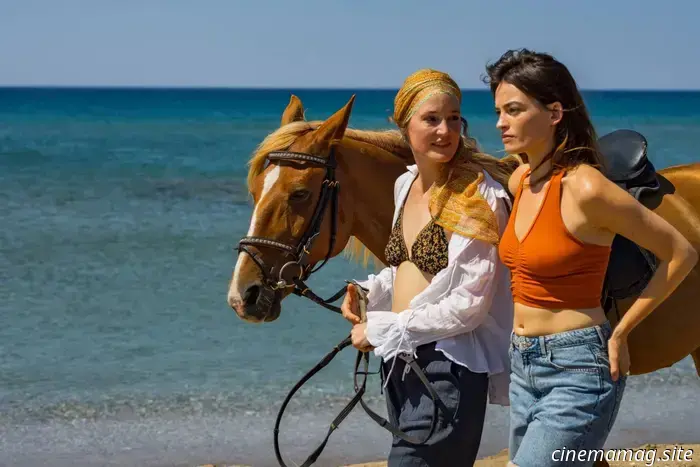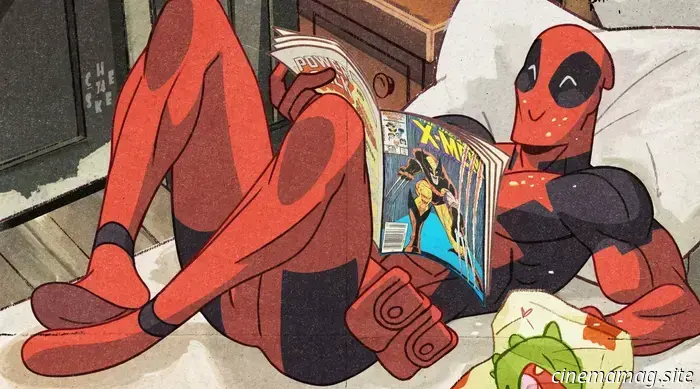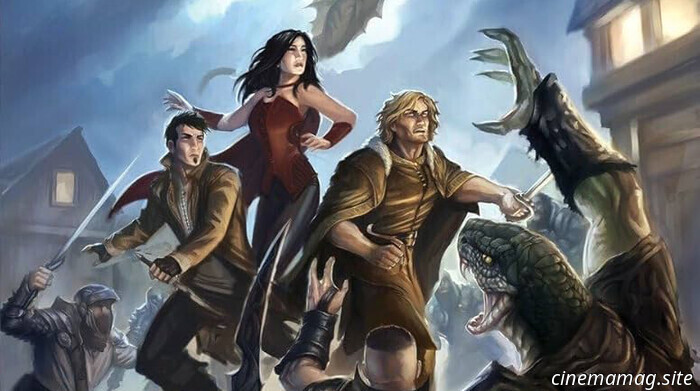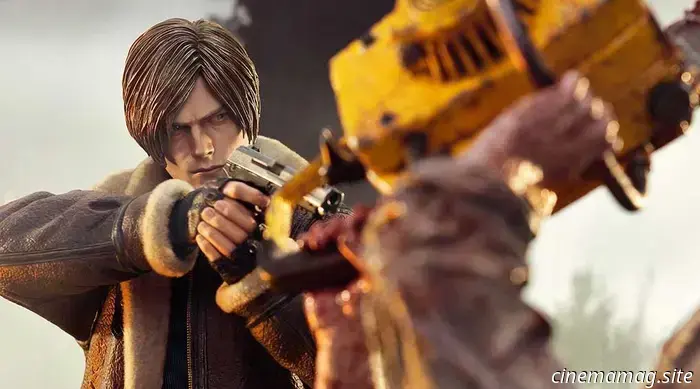
Berlinale Review: Hot Milk Provides a Wonderful Exploration of Maternal Trauma
The relationship between a mother and daughter is seldom portrayed as a love story, at least not in the ways that art has traditionally depicted it. While a mother does love her daughter deeply (and vice versa), this love is often marked by ambivalence and frequently accompanied by resentment. Deborah Levy’s 2016 novel Hot Milk delves into this very ambivalence; Rebecca Lenkiewicz, an experienced screenwriter (Ida, She Said), has adapted the esteemed book for her directorial debut. Set during a sweltering summer in Almería, on Spain’s southeastern coast, Hot Milk follows 25-year-old Sofia (Emma Mackey) and her partially paralyzed mother Rose (Fiona Shaw) as they deal with everyday ailments and maternal traumas, perpetually together yet somehow always apart.
"My mom stopped walking when I was four," Sofia confides to the alternative healer Dr. Gómez (Vincent Perez), the reason behind their journey to Spain. Rose suffers from an elusive illness that defies diagnosis; Sofia's resignation suggests this situation has been ongoing indefinitely, effectively confining her to a caregiver role. "Sofia abandoned her PhD," Rose notes. (It seems that mothers overshadow anthropological pursuits.) Their dynamic of speaking on each other’s behalf appears rehearsed, with Rose dominating the conversation. From the outset, Hot Milk illustrates their imbalance, as the mother’s voice is predominantly heard offscreen, whether issuing commands ("Bring me a spoon") or chastisements ("Don’t blow smoke in my dress"). Although Rose is omnipresent and all-knowing, she is incapacitated and relies entirely on Sofia. This dynamic is familiar to many: control, oppression, and narcissism on one side; and resignation, submission, and guilt on the other.
Lenkiewicz, who felt a strong connection to the source material when first approached to write the screenplay and desired to direct, has an instinctive understanding of the dynamics at play and undoubtedly found the ideal collaborators to translate this narrative to film: cinematographer Christopher Blauvelt (a frequent partner of Kelly Reichardt), editor Mark Towns (who works with Rose Glass), and the cast—Mackey, Shaw, and Vicky Krieps, who plays Sofia’s mysterious love interest, Ingrid—work seamlessly together. This adaptation emphasizes the outward expressions of emotion that resonate throughout. The emotional tension is conveyed through static long takes, precisely timed cuts that keep the scene’s intensity in check, and through the performances that bring to life characters who might not naturally fit together.
Fortunately, Hot Milk avoids the common pitfalls of adaptations using voiceovers or clichés like flashbacks; instead, it captivates with an emotionally driven narrative that permeates every scene. The first glimpse of Ingrid is seen through Sofia’s perspective: a wide shot captures her riding into view on horseback along the beach, transitioning to a low-angle close-up held just a bit longer than usual. Sofia’s awe transforms the already vibrant Vicky Krieps into an almost ethereal being, and her gentle smile takes on profound significance for both Sofia and us. Even as their relationship slowly develops, the two are seldom shown together until an intimate moment that reveals a new facet of the protagonist. A shy kiss shared in the shadows at dusk allows Sofia and Ingrid to connect beyond the frame—it’s evident that their closeness transcends mere words throughout much of the film. It is truly enchanting to watch a character like Ingrid come to life in such a vivid manner, embodying qualities that are nomadic, unstable, and endlessly intriguing—qualities that suggest a fantasy rather than a tangible person.
In a notable choice that honors the source material, Lenkiewicz replaces the novel’s original epigraph ("It’s up to you to break the old circuits"), taken from French writer Hélène Cixous, with the phrase, "I have been to hell and back. And let me tell you, it was wonderful," stitched onto a handkerchief by artist Louise Bourgeois, known for her use of fabrics and domestic symbols in her politically charged installations. The gesture is evident, yet the film does not depend solely on the obvious; all characters exhibit skepticism and challenge each other, sometimes quite vehemently.
While the film's storyline is (deceptively) linear, it maintains a careful balance between the symbolic and the literal—both Rose’s paralysis and Sofia’s multiple stings from jellyfish can be interpreted as metaphors for “the body keeping the score.” The film presents a puzzle to solve, one aspect being the role of the sisters—Ingrid’s and Rose’s—but the overarching theme concerns women: as mothers, daughters, and lovers. Maternal trauma has rarely been portrayed on the big screen with such zest, humor, and an authentic acknowledgment of the ambivalence woven into these relationships.
Hot Milk made its debut at the 2025 Berlinale.

Other articles
 Deadpool celebrates April Fool's Day with special Marvel variant covers.
Marvel has revealed that Deadpool will celebrate April Fool's Day with a series of variant covers featuring the Merc with a Mouth engaging in various pranks, jokes, fake advertisements, and irreverent tributes across seven of the publisher’s titles in March and April. Take a look at them here… Available 3/19 […]
Deadpool celebrates April Fool's Day with special Marvel variant covers.
Marvel has revealed that Deadpool will celebrate April Fool's Day with a series of variant covers featuring the Merc with a Mouth engaging in various pranks, jokes, fake advertisements, and irreverent tributes across seven of the publisher’s titles in March and April. Take a look at them here… Available 3/19 […]
 Dungeons & Dragons: The Forgotten Realms series is being developed by Netflix, with Shawn Levy from Stranger Things involved.
Netflix is preparing to invest in a new high-budget fantasy series, as Deadline reports that the streaming platform has enlisted Stranger Things executive producer and Deadpool & Wolverine director Shawn Levy to create a live-action Dungeons & Dragons series. Titled Dungeons & Dragons: The Forgotten Realms, the prospective series will be set in the […]
Dungeons & Dragons: The Forgotten Realms series is being developed by Netflix, with Shawn Levy from Stranger Things involved.
Netflix is preparing to invest in a new high-budget fantasy series, as Deadline reports that the streaming platform has enlisted Stranger Things executive producer and Deadpool & Wolverine director Shawn Levy to create a live-action Dungeons & Dragons series. Titled Dungeons & Dragons: The Forgotten Realms, the prospective series will be set in the […]
 Eminem as a presidential candidate?
Eminem for president? This intriguing and imaginative idea for addressing the challenges faced by the Democrats has been proposed by New Yorker writer Jay Caspian Kang in the most recent edition.
Eminem as a presidential candidate?
Eminem for president? This intriguing and imaginative idea for addressing the challenges faced by the Democrats has been proposed by New Yorker writer Jay Caspian Kang in the most recent edition.
 Prime 1 Studio introduces a quarter scale collectible statue of Leon S. Kennedy from Resident Evil 4.
Prime 1 Studio has revealed its forthcoming quarter scale statue of Leon S. Kennedy from the legendary video game Resident Evil 4, which is now open for pre-orders. Additionally, there’s a limited edition Bonus Version featuring Leon vs. Chainsaw Villager. You can see the official promotional images and details here… A bullet cutting through chaos, a refined portrayal of […]
Prime 1 Studio introduces a quarter scale collectible statue of Leon S. Kennedy from Resident Evil 4.
Prime 1 Studio has revealed its forthcoming quarter scale statue of Leon S. Kennedy from the legendary video game Resident Evil 4, which is now open for pre-orders. Additionally, there’s a limited edition Bonus Version featuring Leon vs. Chainsaw Villager. You can see the official promotional images and details here… A bullet cutting through chaos, a refined portrayal of […]
 Benedict Cumberbatch taking over Tom Hardy's role in Blood on Snow.
Benedict Cumberbatch is now part of Blood on Snow, as reported by THR, indicating that the actor will take on a role originally intended for Tom Hardy. Aaron Taylor-Johnson takes the lead in Cary Fukunaga’s crime thriller, which is the director of No Time To Die, alongside Cumberbatch, Eva Green, Emma Laird, and Ben Mendelsohn. Taylor-Johnson portrays a hitman and fixer named Olav, who is […]
Benedict Cumberbatch taking over Tom Hardy's role in Blood on Snow.
Benedict Cumberbatch is now part of Blood on Snow, as reported by THR, indicating that the actor will take on a role originally intended for Tom Hardy. Aaron Taylor-Johnson takes the lead in Cary Fukunaga’s crime thriller, which is the director of No Time To Die, alongside Cumberbatch, Eva Green, Emma Laird, and Ben Mendelsohn. Taylor-Johnson portrays a hitman and fixer named Olav, who is […]
 12 Movies About the Adult Entertainment Industry That Present an Unfiltered Perspective
These 12 movies that explore the adult entertainment industry present a raw and unfiltered perspective.
12 Movies About the Adult Entertainment Industry That Present an Unfiltered Perspective
These 12 movies that explore the adult entertainment industry present a raw and unfiltered perspective.
Berlinale Review: Hot Milk Provides a Wonderful Exploration of Maternal Trauma
The relationship between a mother and daughter is seldom portrayed as a love story, especially not in the manner that art has usually depicted it. While it is true that a mother feels a profound love for her daughter (and vice-versa), this affection is characterized by complexity and frequently intertwined with feelings of resentment. Deborah Levy, a British author, addresses this in her 2016 novel Hot Milk.
